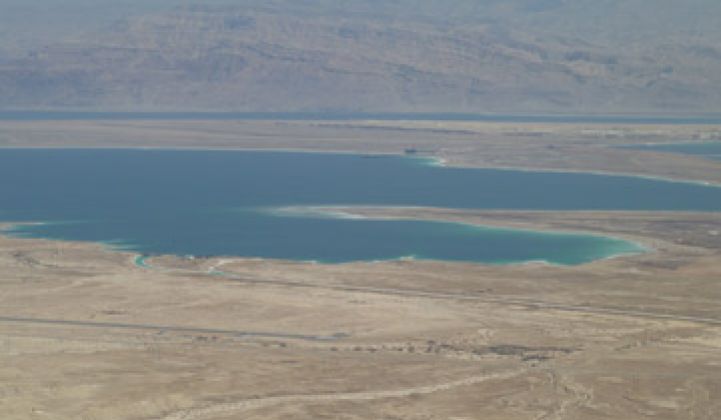Beer-Sheva, Israel --- The Dead Sea, the near lifeless body of water that straddles Israel and Jordan, is ten times saltier than the ocean. And Jiwchar Ganor believes there's a chance to save it with desalination technology.
Ganor, a professor at Ben Gurion University here, is putting the final touches on a proposal to the World Bank to fund a project to save the rapidly shrinking Dead Sea with a mega-engineering project called the Peace Conduit. (I'm over here this week as a guest of the university.)
Under the Peace Conduit, Israel -- arguably the world leader in desalination -- would oversee the construction of a massive desalination plant in water-starved Jordan. The 1,500 to 1,800 million cubic meters of seawater needed to power the plant would come from the Red Sea, a few hundred kilometers to the south. The plant would produce about 800 million cubic meters of water.
Wastewater from desalination plants, many argue, can be harmful to sensitive environments, so discharging 1,000-plus million cubic meters of salty wastewater annually into the Red Sea with its panoply of exotic coral and marine life is a no-go, he said. But that's where the Dead Sea comes in.
The Dead Sea has been shrinking rapidly over the past few decades. From 2000 BC until about 1950, it stayed at roughly 403 meters below sea level, give or take 7 meters. Since 1950, however, the level has dropped 15 meters and it continues to shrink. Ghost boat docks now sit several meters from shore. Industrial plants in the southern section, the diversion of incoming water, and other factors are the likely causes.
"The last ten years, it has shrunk a meter a year," he said.
The decline, in turn, has created its own problems. Sinkholes, which can swallow industrial equipment, have begun to appear on the shoreline. Approximately 1,100 million cubic meters of water are being lost a year through evaporation and only 350 million cubic meters flow into it every year. In earlier times, 1,700 million cubic meters flowed into it and 1,700 million were lost via evaporation. Less is being lost through evaporation now because the water is saltier, which can impede evaporation, he explained.
Without any action, the lake level could drop to 470 to 600 meters below sea level over the next century. "With industry, you can't stabilize the salinity or the level," Ganor said.
Although a shrinking sea would mean the decline of another landmark ecosystem on the Earth, a smaller Dead Sea likely would not hurt Israel economically. It's a major tourist attraction: People literally float on the surface because of the unusual density of the water at the mud allegedly has cosmetic properties. Nonetheless, it would still continue to exist.
"You can't fully dry the lake," he explained. "If the air humidity went to zero percent, then maybe."
The value would come in diplomacy. Jordan needs water and doesn't have a water industry that could compare. Israel continually needs to build links with allies. Sources in the past have told me that Israeli companies actually sell desalination equipment to Arabic nations, but the transactions have to be cloaked in complex financial transactions involving shell companies. An open deal overseen by the World Bank would, ideally, send a different message.
As an added bonus, the wastewater, potentially, could be run through a hydroelectric plant on the 400-meter drop down to the Dead Sea.
Are there dangers? Some. The discharge of wastewater would slightly increase the salinity of the inland sea. Rising salinity in turn could result in algal blooms, turning a blue lake into a red or green one. Gypsum, or calcium carbonate, could begin to form on the surface, turning it white. The Peace Conduit would also be costly -- think north of six billion dollars. Desalinated water alone can cost 50 cents a cubic meter to produce.
"It is an environmental question. It is a social question and absolutely, it is a political question," he said.
As a final note, he added that the situation is different than the Aral Sea, the once-thriving inland sea in Ukraine that has effectively died. Increasing salinity in the Aral killed the fish and caused locals to abandon their livelihoods and villages. There are no fish in the Dead Sea -- only bacteria live there.
"The fishermen would do as well as they did 100 years ago," he said.



